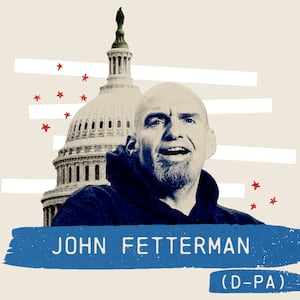The Democrats have averted disaster—for now. They might hold on to the Senate, thanks in large part to the efforts of John Fetterman. And as I write this it’s still just barely possible that they’ll hold onto the House.
But it’s hard to avoid the feeling that their current strategy is running on fumes. Even as President Joe Biden and his party describe the GOP as “semi-fascist” and never miss an opportunity to remind the nation of the Jan. 6 riot at the Capitol, early polling shows that Republicans have continued to pick up black and Hispanic support.
Slogans like “democracy is on the ballot” play well with managers at non-profits listening to NPR in their cars, but they move the needle a lot less with working-class people who can tell perfectly well that the current version of American democracy isn’t doing much to improve their lives. And, while solid majorities of Americans have basically progressive views on social policy issues, using language so performatively inclusive that it sounds strange and synthetic to anyone who went to a state university—rather than a liberal arts college—is going to do nothing to stop the slow purpling of traditionally Democratic constituencies.
If Democrats want to do more going forward than just limp from barely-averted-disaster to barely-averted-disaster, they need a winning message on the material issues most immediately relevant to the lives of ordinary voters. As one of my all-time least favorite Democrats once put it, “It’s the economy, stupid.”
Democracy on the Ballot?
There is a version of “democracy is on the ballot” that might move a broader segment of the electorate. But it would have to be a more grounded one.
Accusations of “fascism” tend to involve a big enough dose of hyperbole to be ultimately unpersuasive, and I’d argue that tenuous analogies to the brownshirts of yore obscure more than they clarify. Could a future presidential election be stolen? Certainly! It’s happened before. But that’s far more likely to happen again the way it happened in the Bush v. Gore election in 2000—by means of guys wearing suits and ties operating within established institutions, not Proud Boys wielding lead pipes somehow overwhelming the Leviathan of the American national security state.
It makes sense to criticize laws passed in Republican-dominated state legislatures that make it more difficult to vote, or to express alarm at the election of Republican secretaries of state who trafficked in conspiracy theories about the 2020 election. But when the “democracy” under threat is an abstraction, and no connection is drawn to kitchen table issues with an immediate impact on voter’s lives, this can ring a little hollow to all but the most dialed-in liberal partisans.

A Sunoco Gas pump reads cash and credit card prices nearing $4 a gallon in Wilkes-Barre, Pennsylvania.
Aimee Dilger/SOPA Images/LightRocket via Getty ImagesAfter all, it’s not like elections don’t keep happening or Democrats don’t often win. The price of food, gas, and pharmaceuticals are more pressing issues for most people.
As progressive journalist Ryan Grim suggested in a conversation last week with his conservative co-host Emily Jashinsky on their show Counterpoints, a far more effective pitch would be that Republicans want to undermine democracy “so they can fleece you.” And there’s an abundance of evidence that fleecing is what they have in mind.
Kevin McCarthy’s Signed Confession
We have, for example, House Minority Leader Kevin McCarthy’s “Commitment to America” document, in which the man who will become Speaker if Republicans take the House openly announces his intention to “save” Social Security and Medicare by cutting benefits. The “save” part is nonsense on stilts—the plan is to simply steal promised benefits from elderly people who have paid into the system their entire lives and who would deserve a secure and dignified retirement even if they hadn’t.

House Minority Leader Kevin McCarthy, R-Calif., addresses an Election Night party at The Westin Washington hotel in Washington, D.C., on Tuesday, November 8, 2022. Rep. Tom Emmer, R-Minn., chairman of the National Republican Congressional Committee, and RNC Chairwoman Ronna McDaniel also appear.
Tom WilliamsWe often hear that Social Security is “economically unsustainable” or that it will “become insolvent” and that the proposed cuts will prevent “insolvency”—but that’s just not how the system works.
The program can’t become “insolvent” because the way the law is currently written builds in a solvency requirement. If Social Security taxes don’t generate revenues sufficient to pay out benefits at the originally projected rate, that triggers an automatic benefit cut. But as Matt Bruenig of the People’s Policy Project points out, the law could easily be amended “to state that, whenever revenue falls short of scheduled benefits, the Social Security payroll tax will automatically be increased to make the two sums balance.” You could even restrict the automatic increases to people making over $150,000 a year and still easily solve the problem typically misdescribed as “insolvency.”
Instead, McCarthy wants to prevent “insolvency” (i.e. benefit cuts) through steeper benefit cuts. The reality of the situation is better described by the late George Carlin’s classic warning that the ruling class in this country is a “big club” that most of us aren’t in and “they’re coming for your Social Security.”
This could have been productively combined with the point about the Republicans’ anti-democratic instincts. “They want to make it harder for you to vote,” Biden could have spent the last year telling people, “so you can’t vote them out when they try to steal your Social Security money.”
Better yet, he could have framed the midterms around an aggressive push for the public health care option he promised during the 2020 campaign and then immediately stopped talking about when he took office. Or better still, he could have gone a step beyond that and adopted Bernie Sanders’s call for a system of Medicare for All where the parasitical private insurance companies were taken out of the picture entirely.

Sen. Bernie Sanders (I-VT) speaks during a health care rally at the Convention of the California Nurses Association/National Nurses Organizing Committee on Sept. 22, 2017 in San Francisco, California.
Justin Sullivan/Getty ImagesOpinion polls consistently show that these proposals have widespread public support. Surely the fact that they’re considered to be unacceptably radical in Beltway politics says something about the state of American democracy. Biden could point to all the polls where a solid majority—even among Republicans—support at least a public option. Then the president could ask why, if we live in a democracy, the people’s will isn’t being done?
The reason he and other prominent Democrats haven’t done any such thing is that this isn’t the kind of pro-democracy message they have any interest in promoting. As Thomas Frank argued in his indispensable book Listen, Liberal: Or, What Ever Happened to the Party of the People, the current version of the Democratic Party has been thoroughly shaped by the cultural sensibilities and political worldview of affluent middle-class professionals, who see social justice as a matter of removing any barriers to the best and brightest from each demographic group rising to the top—so they can craft the smartest technocratic solutions to our problems.
They believe in democracy in so far as they believe that Democratic politicians shouldn’t have elections stolen from them. But they don’t really believe in asking a bunch of people who don’t have postgraduate degrees (and probably haven’t even read Robin DiAngelo’s White Fragility), how they want to solve society’s problems.
Which Way for 2024 Democrats?
Right now, Democrats are doing everything short of spraying each other with bottles of champagne to celebrate the results of an election where they might have held onto control of the Senate by their fingernails—and they might not have even done that. As of the time I’m writing, The New York Times election forecast says that Republicans will “probably” retake the House. The happy surprise is that they weren’t blown out of the water completely by the party that openly wants to slash Medicare and Social Security.

Sen. Elizabeth Warren addresses a rally in support of Social Security and Medicare on Capitol Hill Sept. 18, 2014 in Washington, DC.
Chip Somodevilla/Getty ImagesIf Democrats do manage to hold onto the Senate, a big part of the reason why will be that John Fetterman beat Republican Mehmet Oz for the U.S. Senate seat in Pennsylvania. This was a remarkable victory—and one that can tell us a lot about what a better approach than the one most Democrats are taking right now might look like.
Fetterman outperformed Biden’s 2020 vote in almost every county in the state, “including in rural areas where Trump racked up votes.” That’s a particularly impressive accomplishment, after he suffered a stroke early in the campaign that left him with auditory processing issues many observers mistook for cognitive impairment.
So why did he win? Elections are never laboratory experiments in which we can test individual factors in isolation from everything else. There are any number of reasons why Fetterman won (and Oz lost) and if you reran the election with one or two other variables changed you might well end up with a different result. But it’s hard to deny that one important reason Fetterman was able to do so well is that he has left-populist instincts that are utterly foreign to the mentality of far too many other Democratic politicians.
He supports equal rights for trans people, for example, but it’s impossible to imagine him using terms like “birthing people.” When he spoke out against a law that would have prevented trans teens from participating in high school sports, Fetterman explained his position the way you might explain your progressive views about something like that to a conservative friend at a bar—saying the law was “cruel” and calling it a distraction from Pennsylvania’s real problems.
And when it comes to those real problems, he’s sometimes shown himself willing to appeal to deep wells of popular anger against the plutocrats in the “big club.” In an op-ed for the Pennsylvania Times Leader, he urged the criminal prosecution of executives at food, pharmaceutical, and oil and gas companies who have been “gouging customers at the pump and at the grocery store” even as they brag to investors in earnings calls that they’ve been raking in record profits.
I’m not suggesting that Fetterman is perfect. (He isn’t.) But his against-the-odds success in a purple state offers a tantalizing glimpse into what might be possible elsewhere if Democrats get sick of narrowly averting disaster and decide, at long last, to try something else.








